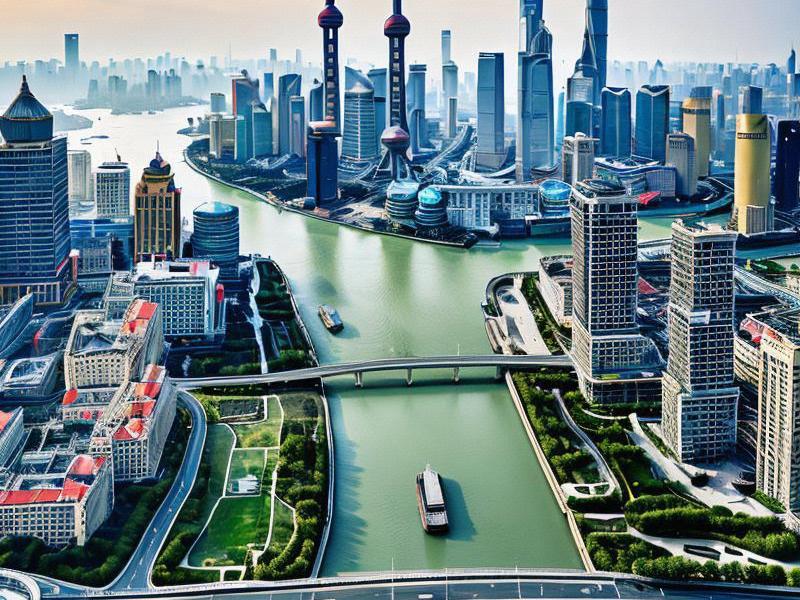
Introduction
Shanghai, the bustling metropolis on the eastern coast of China, has long been a symbol of the country's economic prowess and cultural vibrancy. As the financial capital of China, Shanghai is not only a hub for commerce and trade but also a melting pot of cultures from across the globe. However, the story of Shanghai's success is not confined to the city itself; it is intricately linked with the surrounding areas that contribute to its growth and development.
Economic Development
Shanghai's Economic Powerhouse
Shanghai's economy is a powerhouse, driven by a diverse range of industries including finance, manufacturing, technology, and real estate. The city is home to the Shanghai Stock Exchange, one of the largest stock exchanges in the world, and the Pudong Financial District, which houses some of the world's tallest skyscrapers and major multinational corporations.
The financial sector is the backbone of Shanghai's economy, with the city serving as a key player in global finance. The presence of international banks, insurance companies, and asset management firms has made Shanghai a global financial center, attracting capital and talent from around the world.
Surrounding Areas: The Economic Engine
The surrounding areas of Shanghai, collectively known as the Yangtze River Delta (YRD) region, are equally important to the city's economic success. The YRD region, which includes cities such as Suzhou, Hangzhou, Ningbo, and Wuxi, is one of the most economically developed regions in China.
Suzhou, known as the "Venice of the East," is a hub for high-tech manufacturing and has a strong presence in the textile and electronics industries. Hangzhou, the capital of Zhejiang province, is renowned for its e-commerce industry, with Alibaba being headquartered there. Ningbo, a major port city, is a center for logistics and trade, while Wuxi is known for its advanced manufacturing and semiconductor industries.
爱上海419论坛 The integration of these cities into a cohesive economic zone has created a synergistic effect, driving regional growth and development. The YRD region accounts for a significant portion of China's GDP and is a key driver of the country's economic transformation.
Cultural Exchange
Shanghai: A Cultural Melting Pot
Shanghai's cultural scene is a vibrant tapestry woven from influences of various cultures. The city's colonial history has left a lasting impact on its architecture, cuisine, and lifestyle. The Bund, with its iconic skyline of historic buildings, stands as a testament to Shanghai's cosmopolitan past.
The city is also home to a thriving arts scene, with numerous museums, galleries, theaters, and music venues. The Shanghai Museum, one of the largest and most prestigious museums in China, houses an impressive collection of ancient Chinese art. The city's annual Shanghai International Film Festival attracts filmmakers and audiences from around the world.
Surrounding Areas: Rich Cultural Heritage
The surrounding areas of Shanghai are rich in cultural heritage, offering a glimpse into the diverse traditions and customs of the region. Suzhou is famous for its classical gardens, which are UNESCO World Heritage Sites, and its silk production. Hangzhou is renowned for its West Lake, a picturesque destination that has inspired poets and artists for centuries.
Ningbo is home to the ancient city of Shaoxing, known for its wine culture and traditional architecture. Wuxi is famous for its Taihu Lake, a popular tourist destination, and its tea culture. These cities not only preserve their rich cultural heritage but also actively promote cultural exchange and tourism.
Regional Integration
上海龙凤419自荐 The Yangtze River Delta Integration
The integration of Shanghai and its surrounding areas into a cohesive regional entity is a key strategy for promoting economic growth and development. The Yangtze River Delta Integration initiative aims to crteeaa unified market, improve infrastructure connectivity, and enhance regional cooperation.
The construction of high-speed rail networks, highways, and waterways has facilitated seamless travel and trade between the cities. The establishment of regional development zones and industrial parks has attracted investment and promoted industrial upgrading.
The Role of Shanghai
Shanghai plays a central role in the regional integration process, serving as a hub for finance, trade, and innovation. The city's advanced infrastructure, skilled workforce, and business-friendly environment make it an ideal location for companies looking to expand into the region.
The Shanghai Free-Trade Zone (FTZ) is a flagship initiative that has streamlined customs procedures, reduced tariffs, and promoted investment. The FTZ serves as a model for other regions in China and has contributed to the overall economic reform and opening-up of the country.
Challenges and Opportunities
Environmental Sustainability
419上海龙凤网 As the region continues to grow and develop, environmental sustainability becomes a critical concern. The rapid urbanization and industrialization have led to challenges such as air pollution, water scarcity, and waste management. The cities in the YRD region are taking proactive measures to address these issues through the implementation of green technologies, sustainable urban planning, and environmental regulations.
Innovation and Technology
Innovation and technology are key drivers of the region's future growth. The cities in the YRD region are investing heavily in research and development, fostering a culture of entrepreneurship, and attracting top talent. The presence of world-class universities, research institutions, and technology parks has created a fertile ground for innovation.
Regional Cooperation
Regional cooperation is essential for achieving common goals and addressing shared challenges. The cities in the YRD region are working together to promote trade, investment, and cultural exchange. The establishment of regional organizations and forums provides a platform for dialogue and collaboration.
Conclusion
Shanghai and its surrounding areas represent a dynamic and interconnected region that is at the forefront of China's economic and cultural development. The city's status as a global financial center and a cultural melting pot is complemented by the rich heritage and economic strength of the surrounding areas.
The ongoing efforts towards regional integration, environmental sustainability, and innovation will ensure that the Yangtze River Delta remains a beacon of progress and prosperity. As the region continues to evolve, it will play an increasingly important role in shaping the future of China and the global economy.
